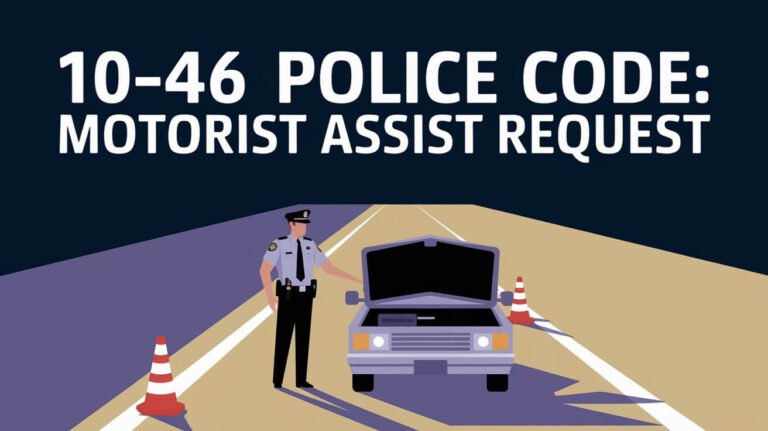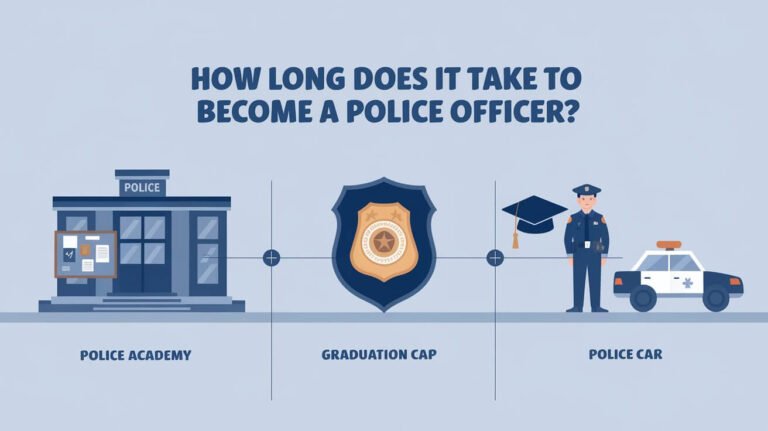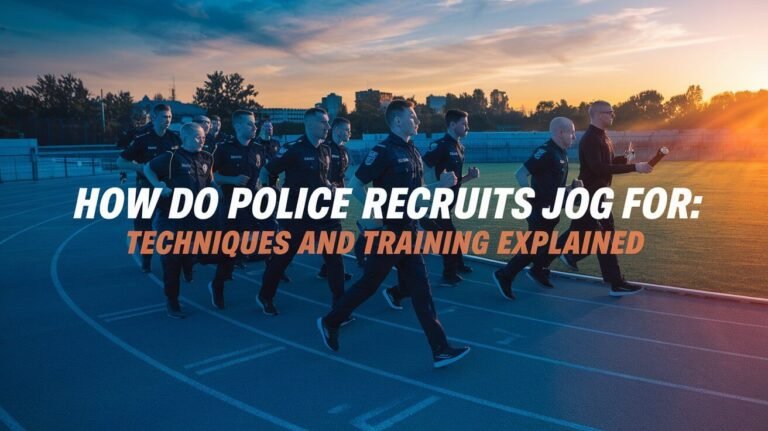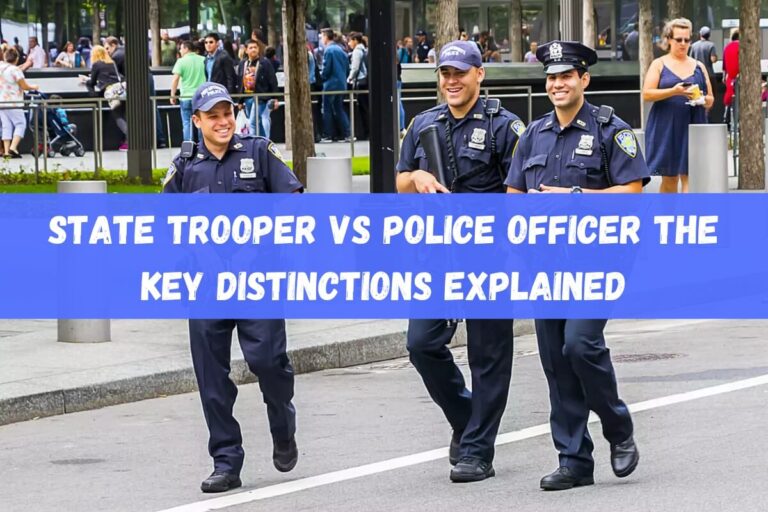Police Officer vs Firefighter: Which Career is Right for You?
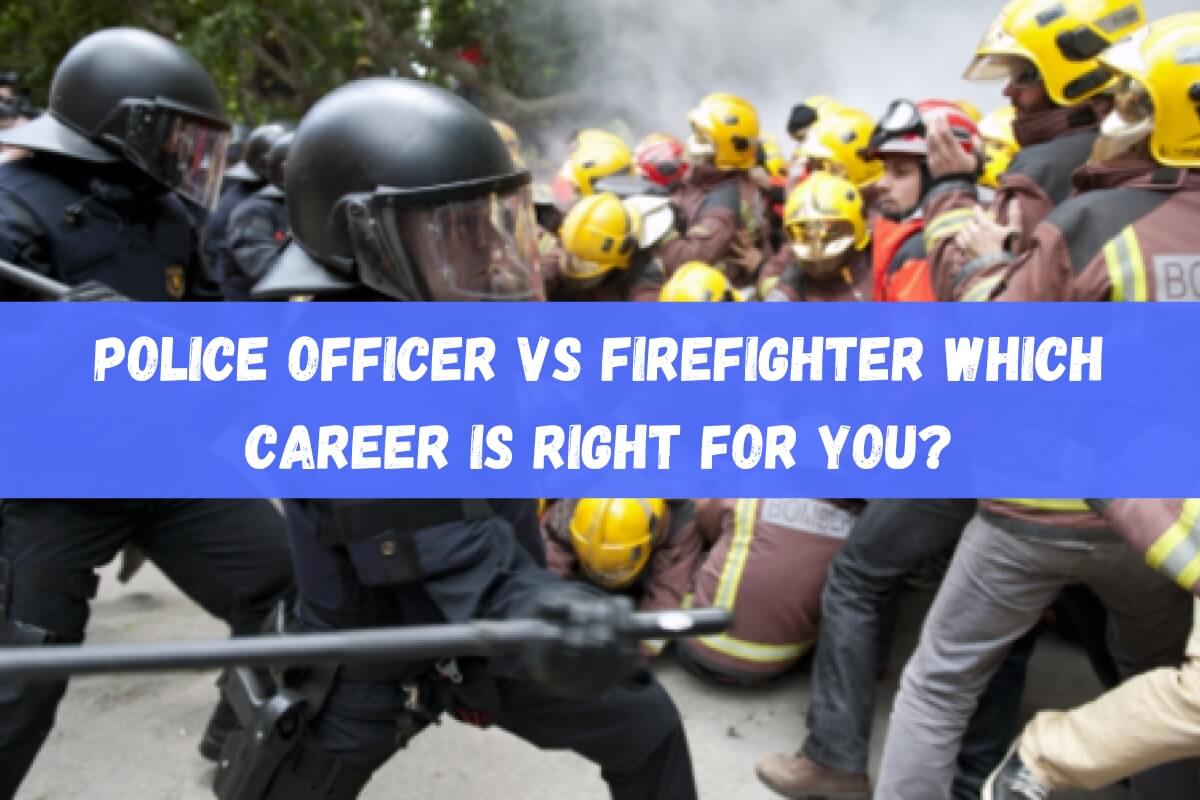
Serving one’s community is a noble calling that can take many forms. Two professions that epitomize this commitment are police officers and firefighters. These brave men and women put their lives on the line daily to protect citizens and property.
Both roles require courage, quick thinking under pressure, and a strong team mentality. However, the specific duties, work environments, and career paths for cops vs. firefighters differ significantly.
So which of these vital public service careers is the better fit for you – police officer or firefighter?
The answer largely depends on your interests, personality type, and professional goals. This comprehensive guide will dive deep into the key distinctions between these two first responder jobs so you can make an informed decision about your future.
You’ll learn about the daily responsibilities, education and training requirements, work schedules, salary expectations, job outlook, and more for police officers vs. firefighters. We’ll also examine the pros, cons, and inherent risks of each profession to help you choose the right career path.
The Role of a Police Officer Police officers are tasked with upholding laws and maintaining public safety within their jurisdictions. Their core responsibilities revolve around deterring crime and promoting an orderly society.
Some typical day-to-day duties of a police officer include:
- Patrolling assigned areas and neighborhoods
- Responding to emergency calls from citizens
- Conducting traffic stops and issuing citations
- Investigating suspicious activities
- Gathering evidence from crime scenes
- Apprehending and arresting suspected criminals
- Writing detailed reports on incidents
As officers gain experience, they often have opportunities to specialize in areas like:
- Criminal investigations (detectives)
- K9 units working with police dogs
- Special Weapons and Tactics (SWAT) teams
- Mounted (horse) patrol
- Community relations and outreach
Police work requires a blend of physical and mental abilities. Officers must be prepared to act quickly in fast-paced, potentially dangerous situations involving confrontation or violence.
The Role of a Firefighter While police focus on enforcing laws, the primary mission of firefighters is to protect lives and property in the event of fires and other emergencies. Their heroic work involves highly specialized training in fire suppression and prevention tactics.
Some of the key responsibilities of firefighters include:
- Responding to fire alarms and calls regarding fires
- Operating powerful equipment like hose lines, ladders, and pumps to extinguish fires
- Performing search and rescue operations in burning buildings
- Providing emergency medical care and first aid
- Inspecting buildings for fire code violations
- Testing fire alarms and equipment
- Conducting public education on fire safety
In addition to battling active fires, firefighters also frequently respond to other crisis situations like:
- Vehicle accidents and extracting trapped victims
- Natural disasters like earthquakes or hurricanes
- Hazardous materials spills or leaks
- Swift water rescues during flooding
The work requires immense physical strength and stamina. Firefighters must be able to carry heavy equipment, remain calm under extreme stress, and make split-second decisions when lives are at stake.
Job Requirements: Police Officer vs Firefighter
Education: Most police departments require officers to hold at least a high school diploma, though some give preference to candidates with college degrees, especially in fields like criminal justice. Firefighters typically need a high school diploma along with specific fire science training or EMT certification.
Training:
- Police officers must complete intensive training at a police academy that lasts around 5-6 months. This covers areas like state laws, firearms skills, self-defense, emergency response, and report writing.
- Firefighters go through fire academy training programs lasting 12-24 weeks. This includes classroom instruction along with practicing real-world scenarios in burning building simulators.
Other Requirements:
- Pass written, physical ability, medical, and background exams
- Be between 18-37 years old (maximum ages vary)
- Possess a valid driver’s license
- U.S. citizenship (for most departments)
- No felony convictions on your record
Which Job Is More Dangerous?
Both police officers and firefighters undertake inherently risky work to protect the public’s safety. However, the specific dangers they face on the job differ.
Police officers frequently encounter potentially violent situations involving:
- Armed criminals
- High-speed vehicle chases
- Domestic violence disputes
- Aggressive crowds or protests
According to data from the FBI, 59 police officers were feloniously killed in the line of duty in 2021.
For firefighters, the primary hazards include:
- Smoke inhalation and toxic fumes
- Extreme heat and burns from flames
- Risk of building collapse or explosion
- Falling debris like glass or loose objects
Statistics from the U.S. Fire Administration reported 70 on-duty firefighter fatalities in 2021. The leading causes were vehicle accidents, being struck by objects, and exposure to fire hazards.
Both professions involve rigorous safety training to mitigate risks, along with specialized protective equipment like bulletproof vests, heat-resistant gear, and Self-Contained Breathing Apparatus (SCBA).
How Do Police and Firefighter Salaries Compare?
While both police officers and firefighters earn respectable incomes, there is a noticeable salary gap between the two careers on average.
According to 2024 data from ZipRecruiter:
- The average annual salary for police officers is $62,148
- The average annual salary for firefighters is $70,123
Of course, actual earnings can vary significantly based on:
- Cost of living in the job’s geographic location
- An officer or firefighter’s rank and years of experience
- Whether they work in the public vs private sector
- Opportunities for overtime pay
For example, the highest paid police officers tend to work in metropolitan areas like San Jose, CA ($111,000 average) and San Francisco, CA ($103,116).
Firefighters earn the highest average salaries in places like Los Angeles ($94,303) and New York ($74,900). The top-paying U.S. states for firefighters are California ($78,350) and New Jersey ($77,740).
Pay tends to rise significantly with experience in both fields:
- Entry-level police officers average around $48,500 annually
- Officers in the 75th percentile earn over $74,500
- Rookie firefighters start around $41,000
- 20+ year veteran firefighters make $70,000+
Which Career Path Offers More Advancement?
Both police officers and firefighters follow a fairly typical paramilitary-style rank structure with defined opportunities for upward career mobility and promotions over time.
Common career ladders include:
Police Career Path:
- Police Officer
- Corporal
- Sergeant
- Lieutenant
- Captain
- District/Precinct Commander
- Deputy Chief
- Police Chief
Firefighter Promotions:
- Firefighter
- Engineer (operates fire trucks/vehicles)
- Lieutenant
- Captain
- Battalion Chief
- Assistant/Deputy Chief
- Fire Chief
In the upper ranks like Chief, salaries well over $100,000 annually are common for both professions in major metropolitan areas.
Beyond the standard promotion paths, police departments offer more opportunities for lateral career movements. Officers can transfer into specialized divisions like:
- Detectives/Criminal Investigations
- SWAT
- Bomb squad
- Undercover narcotics
- K9 units
- Air support/aviation
- Community outreach
This type of role specialization is less common for firefighters. However, some pursue training as paramedics, fire inspectors/investigators, instructors, or public information officers.
Work Schedules & Environments
One of the starkest contrasts between the duties of police officers vs. firefighters is their typical work schedules and settings.
Police Work Schedules: Most police departments have officers work shifts, with common examples including:
- 5 days on, 2 off (8-10 hour shifts)
- 4 days on, 2 off (10-12 hour shifts)
- 7 days on, 7 off (12-hour shifts)
Shifts rotate frequently between day, evening, and overnight hours to ensure 24/7 police coverage. Officers are expected to be available for calls at any time, often working holidays and weekends.
The very nature of police work means long hours during busy periods, major crimes, or events. Officers may be required to remain on active duty well beyond their scheduled shift times.
Firefighter Schedules: In contrast, firefighters tend to work much longer stretch shifts of 24 hours on duty, followed by 48-72 hours off. This allows firefighters at the station to remain available around the clock to respond to emergency calls.
During their 24-hour shifts, firefighters live and sleep at the firehouse. Between calls, they can eat meals, exercise, watch TV, study training materials, and even get short naps when possible.
Some fire departments utilize other schedule models like working 10/14 days in a row, followed by 10/14 days off to balance out the shifts.
Work Environments:
Police officers spend a majority of their workday in patrol vehicles, walking/driving around their precinct’s streets and neighborhoods. They also frequently respond to accident scenes, private residences, businesses, or wherever incidents occur within their jurisdiction.
Firefighters are stationed at firehouses, staying alert and ready to respond with equipment like fire trucks, engines, and ambulances. Once dispatched, they may find themselves battling structure fires in homes or high-rise office buildings. They also get called to outdoor fires, hazardous materials spills, and vehicle accidents where their medical training is vital.
Physical Demands: Both policing and firefighting are extremely physical, demanding careers. Officers and firefighters need strength, stamina, and abilities like:
- Running for extended periods
- Lifting and carrying heavy objects/people
- Climbing stairs and ladders
- Breaking down doors or clearing debris
- Operating unwieldy equipment like hose lines
- Wearing heavy protective gear like bulletproof vests or turnout gear
Candidates undergo rigorous physical ability exams as part of the hiring process to ensure they meet the job’s intense physical requirements.
Which Job is the Better Fit for You?
At this point, you likely have a better understanding of the key similarities and differences between being a police officer versus a firefighter. But which career path better aligns with your skills, interests, and personal priorities?
Consider whether you match up better with these typical police officer traits:
- Ability to remain assertive and take charge of confrontational situations
- Interest in investigative work, collecting evidence, writing reports
- Comfortable working alone and making independent decisions
- Flexible to work rotating shifts, holidays, and long hours
Or do these common firefighter characteristics resonate more?
- Adrenaline-seeker who stays calm under intense pressure
- Oriented toward hand-on tactics, operating equipment
- Thrives in a classic paramilitary, team-based environment
- Able to live at the firehouse during 24+ hour shifts
Your decision may also depend on your tolerance for specific risks associated with each job – like facing armed suspects as a cop or entering burning buildings as a firefighter.
Future Job Outlook Looking ahead, what does the long-term employment forecast look like for police officers and firefighters?
According to the U.S. Bureau of Labor Statistics’ projections for 2022-2032:
- Police officer positions are expected to grow by 3% (as fast as average for all occupations)
- Firefighter jobs should see 4% growth (slightly slower than average)
For police officers, much of the projected demand will stem from replacements needed as current officers reach retirement age or transfer to other occupations.
Firefighter employment growth is tied to increasing call volumes and community expansion requiring more fire departments and personnel. Competition for full-time firefighter careers is expected to remain high due to the job’s appealing nature.
Wildcard factors like government funding levels, crime rates impacting police staffing needs, and the hiring of paid firefighters versus volunteers could all impact future job outlooks.
Overall Pros and Cons
Pros of Being a Police Officer:
- Relatively high job security and employment benefits
- Early retirement qualifications after 20-25 years of service
- Ability to specialize in niche areas like K9, SWAT, investigations
- More diverse duties beyond just patrol (community relations, administration, etc.)
- Structured pathway for career advancement and promotions
Cons of Being a Police Officer:
- High-stress situations dealing with confrontations, criminals
- Public criticism and scrutiny of police actions
- Shift work, being on-call at all hours, extra overtime
- Physical dangers from weapons, vehicle pursuits
Pros of Being a Firefighter:
- Immense sense of pride in rescuing lives and serving the community
- Strong camaraderie from living/working together at the firehouse
- Diverse emergency responsibilities beyond battling fires
- Excellent pay/benefits and job security with most municipalities
- Early retirement possible after 20-25 years in many jurisdictions
Cons of Being a Firefighter:
- Physically grueling work hauling heavy equipment in all conditions
- High-stress, life-or-death situations with fires, medical calls
- Limited opportunities for role specialization or switching career paths
- Disrupted sleep schedules from 24-hour shift rotations
Conclusion
In summary, the roles of police officers and firefighters both play critical parts in maintaining public safety and responding to emergency situations. However, the daily responsibilities, workplace environments, and career trajectories involved in these first responder professions differ significantly.
Carefully consider your priorities, interests, personality traits, and desired work-life balance. Do you feel called to the law enforcement aspects of policing – deterring crime, collecting evidence, upholding societal order? Or does your drive to help others align more with the emergency response tactics of firefighting?
Weigh the pros, cons, and future outlook for each vocation as you decide which noble path is the ideal career fit. No matter which you choose, you’ll find immense personal fulfillment in joining the ranks of these selfless public servants committed to protecting their communities.


